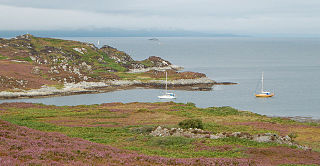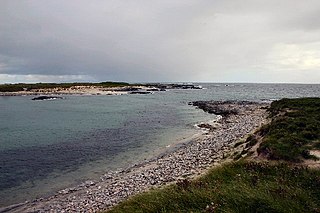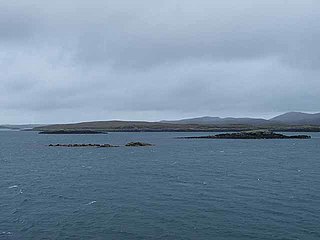| Scottish Gaelic name | Eileanan Chearabhaigh |
|---|---|
 The islands of Eileanan Chearabhaigh at centre, with mainland Benbecula in the foreground and the northern tip of Wiay beyond | |
| Location | |
| OS grid reference | NF866476 |
| Coordinates | 57°25′N7°13′W / 57.41°N 7.22°W |
| Physical geography | |
| Island group | Uist |
| Area | 49 ha (120 acres) [1] |
| Highest elevation | c. 23 m (75 ft) [2] |
| Administration | |
| Sovereign state | United Kingdom |
| Country | Scotland |
| Council area | Comhairle nan Eilean Siar |
Eileanan Chearabhaigh is a collection of small uninhabited tidal islands off the south east coast of Benbecula in the Outer Hebrides of Scotland. The English language name Keiravagh Islands is sometimes used. [3]
Contents
Bounded by the tidal waters of Loch Chearabhaigh to the north and Loch a' Laip to the south, the land area of the group defies a simple description. At low tide the islands form a peninsula with a total area of about 50 hectares (120 acres), which is connected to Benbecula by drying sands. At high tide the connection to Benbecula is lost and a number of small islets stretching for over two kilometres (1+1⁄4 mi) from east to west appear, the largest of which is about 31 hectares (77 acres) in extent. [Note 1] None of these individual islets are named by the Ordnance Survey. Argyll Yacht Charters supply a table of islands statistics that list the "Kiervagh islands" as being 49 hectares (120 acres) in extent, although the method of measurement is not explicit. [1]
The uninhabited island of Wiay lies to the south and fish farming is undertaken in the productive waters of Loch a' Laip and Loch Chearabhaigh. [3] [4] Loch a' Laip also provides shelter for visiting water craft but the area is strewn with rocks and skerries. There is a pier on Benbecula served by a track at the western end of Eileanan Chearabhaigh and another to the south at Eilean na Cille, although their use without local knowledge is not advised. [2] [5]













